TOPLINE:
A panel has issued an opinion on managing actinic keratosis (AK) in immunocompromised (IM) patients, given that immunosuppression increases the risk for these lesions and their subsequent progression to squamous cell carcinoma.
METHODOLOGY:
- In the Personalising Actinic Keratosis Treatment (PAKT) project, experts formulated consensus recommendations on tailored patient care for the general population.
- To elaborate on these recommendations specifically for IM patients, a panel of eight European dermatologists was convened for the IM‑PAKT project.
- The panellists gave their expert opinions on management, using three fictional IM patients with AK to highlight various aspects of care.
TAKEAWAY:
- The patients were a 57-year-old woman receiving long-term immunosuppressive therapy for inflammatory bowel disease, a 71-year-old man with chronic lymphocytic leukaemia, and a 45-year-old man who had undergone kidney transplantation.
- For all IM patients with AK, the panellists recommend prompt assessment by dermatologists for clinical findings and risk factors.
- They endorse a risk factor–based approach to management, taking into consideration the nature of the immunosuppression, prior history of AK and skin cancer, lifetime exposure to ultraviolet radiation, and patient treatment preferences.
- The panellists offer a triage tool based on patients' risk profile, with tailored screening intervals ranging from 12-18 months for patients at low risk to 1-3 months for patients at very high risk.
IN PRACTICE:
"[D]ermatologists should establish collaborative and transparent relationships with patients' multidisciplinary teams to enhance overall care for patients' comorbidities: given their increased risk of progression to malignancy, earlier assessments/interventions and frequent follow-ups are vital," the authors wrote.
SOURCE:
The study was led by Rolf‑Markus Szeimies, MD, PhD, Klinikum Vest GmbH Academic Teaching Hospital, Recklinghausen, Germany, and was published online in Dermatology and Therapy.
LIMITATIONS:
Limitations included gaps in the evidence regarding AK management in IM patients and uncertain generalisability to other populations and health systems.
DISCLOSURES:
The IM-PAKT project's planning and delivery were funded by Galderma, which manufactures drugs to prevent and treat AK. Several authors disclosed affiliations with companies that manufacture drugs or devices to manage AK.



